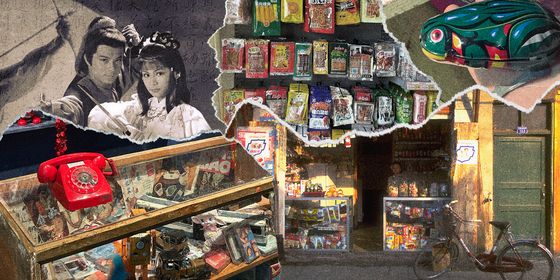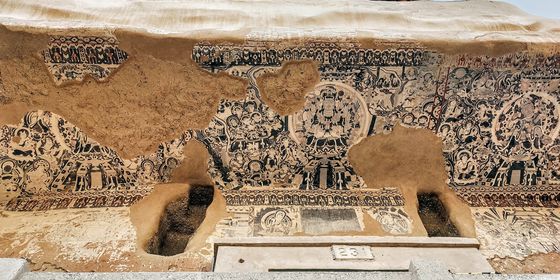"If the Cultural Revolution hadn't happened...my life might have been completely different"—a retired factory worker recounts his life in Beijing amid upheaval and poverty
Note from the author:
It was around 10 p.m. when I first met Guo Fucheng. He was sitting cross-legged in front of a Sichuan restaurant on Gulou Dongdajie, wearing a sporty dark-colored coat and an army green vest that revealed the collar of a button-down plaid shirt. His sparse gray hair scattered over his head. Holding a slim half-smoked cigarette, he was chatting to a friend in a thick Beijing accent while puffing away.
Guo Fucheng, 69 years old, retired worker and noodle shop owner from Beijing
My wife passed away 10 years ago. In the last dream I had of her, we were discussing who should pick up our son after school.
There was nothing significant in that dream, just like all the dreams I’ve had about her—they’re never about anything more than the trivial daily happenings we experienced. It was just like the ordinary married life we had together; there were no big ups or downs.
I was born in 1952. We were a big family: I had two older sisters, two younger sisters, and two younger brothers. My father used to run a small business to support the family while my mother stayed at home looking after the kids. In the 1950s, China merged private businesses with state ownership. My father’s business became state-owned, and he became a worker in it.
Our whole family relied on just my father’s paltry salary—there were many mouths to feed. During the Great Famine from 1959 to 1961, starvation was common. At that time China was a planned economy; every month we were only given a certain number of coupons to buy things. You needed a coupon for everything—you couldn’t even get an extra steamed bun without a coupon. When we got so hungry that we couldn’t take it anymore, we cooked thin rice porridge. We were basically drinking water to fill our bellies.
Even today, most people of my generation are still very thrifty. We’ve been through hardship, so we became used to living frugally. Not like young people today, who order a table full of food and leave half of it untouched.
The Cultural Revolution began just after I started junior high school. Things were especially intense in the first three years. Often we would go to school in the morning only to find a notice telling us that class was suspended for the day. Instead of going to class, students carried out the revolution, put up “big-character posters,” and joined public meetings to criticize and denounce the teachers.
During my three years of junior high, I barely attended a single class. I graduated, but actually my education stayed at a primary-school level.
The streets in Beijing at that time were chaotic too. Luckily, both of my parents were from a 'clean' class background, so the revolution didn’t have much of an impact on them. Like other ordinary families, we tried to keep our heads down and not get involved in the chaos. We minded our own business, worked every day as usual, and waited for things to calm down.
I graduated from junior high in 1969, when the Cultural Revolution had eased up a little bit. But the gaokao (college entrance exam) was cancelled and there was nowhere for me to continue my education. At 17, I was sent to be an apprentice at a factory. After three years, I was officially hired to repair electrical equipment.
I met my wife at the factory. We were coworkers. It was a time when the government promoted marriage at a later age, so we didn't get married until almost five years into our relationship, the year I turned 28. The “late marriage, late birth” policy was stricter in big cities like Beijing. It was the same as the Family Planning Policy: If the government said you could only have one child, you could only have one child.
After my son was born, my wife and I took turns taking care of him. Sometimes we had to work night shifts at the factory, so whichever one of us stayed at home cooked and took care of the child.
Over the decades of our marriage, we would occasionally argue. That was normal: Even pots and pans bang against each other sometimes, right? But we never had any serious quarrels. At worst, she would get angry and go back to her parents’ home. I would act apologetic and bring her back home.
People of my generation attached a lot of significance to marriage, and divorce was the last thing we would think of. A divorce would leave a stain on your record. With that “stain,” it was almost impossible for you to get a new job. Losing a job back then was crushing; there weren’t many ways to earn a living. Only after Reform and Opening Up could people with “stains” in their past try to earn a living as street vendors, or by doing business.
My wife passed very suddenly. She was perfectly fine one night when she went to bed, but didn’t wake up the next morning. It was a heart problem. Her sudden passing really shook me—I wasn’t prepared at all. And it took me two years to finally accept and get used to the fact that she was no longer around. After my wife died, my son started making regular visits to see me. Sometimes he’ll stay with me for a few days to keep me company.
Looking back on our youth, life was far from plentiful, but it was simpler back then. Relations between people were simpler too. People weren't separated by class, and there wasn’t such inequality in wealth. When I finished my apprenticeship at the factory, I was paid 41 kuai, 7 mao, and 1 fen per month. Chairman Mao was paid 408 kuai—I only earned 10 times less than him!
After retirement, I started a small noodle restaurant. It's only a few square meters large, but I own the property, so I don’t need to pay rent. It doesn’t really matter how many customers we have each day. I only hired one employee; when things get too busy for us to handle, I just serve fewer customers.
If the Cultural Revolution hadn’t happened, I might have been able to go to senior high school and eventually college. My life might have been completely different. But you never know when history will hit you, so all you can do is accept your fate and live with it. It’s like buying a lottery ticket: If you didn’t get a lucky draw, there’s no way to start over. It’s better just to let it go.
When my classmates and I get together, we rarely talk about the Cultural Revolution or about politics; we just exchange pleasantries. Some used to hold a lot of grievances, but after so many years, most of us eventually let it go.
Our generation was a one of hardship and dedication. Not once in our whole life did we live to realize our own value. Instead, we lived to follow the country’s call, and learn to work hard to support our family.
At my age, I don’t require anything more from life. I don't want to live to be 100 either. If I catch some serious illness one day—if I'm bedridden and in constant pain, and I've no quality of life to speak of—I hope I can die without a fuss. Like most ordinary people, it doesn't really matter how I lived. I can't speak of having any regrets, and that's good enough.
Cover image from VCG
Huang Chenkuang is a writer based in Beijing originally from Jiangxi province. She is the founder of the Beijing Lights project with literary arts collective Spittoon, sharing voices from Beijing’s 21.7 million humans.












